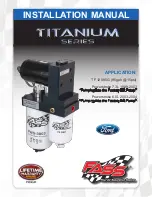
RECREATIONAL TOWING
Follow these guidelines for your specific powertrain combination to tow
your vehicle for personal travel (such as behind a motor home or a
truck).
Note:
Put your climate control system in recirculated air mode to
prevent exhaust fumes from entering the vehicle. Refer to the
Climate
Controls
chapter for more information.
In case of roadside emergency with a disabled vehicle, please refer to
Wrecker towing
in the
Roadside Emergencies
chapter.
These guidelines are designed to prevent damage to your vehicle.
Front-wheel drive (FWD) vehicles:
Tow your FWD vehicle with all four wheels on the ground or with the
front wheels off the ground by using a tow dolly. If you are using a tow
dolly follow the instructions specified by the equipment provider.
All-wheel drive (AWD) vehicles:
Tow your AWD vehicle with all four wheels on the ground or with all four
wheels off the ground using a vehicle transport trailer.
Do not tow your
AWD vehicle with the front wheels off the ground (by using a tow
dolly) and the rear wheels on the ground; this will cause damage
to your AWD system.
If you are using a vehicle transport trailer, follow
the instruction specified by the equipment provider.
Note:
If you tow your vehicle with all four wheels on the ground, follow
these instructions:
•
Tow only in the forward direction.
•
Release the parking brake.
•
Place the transmission shift lever in N (Neutral).
•
Place the ignition in the accessory position (refer to
Starting
in the
Driving
chapter).
•
Do not exceed 65 mph (105 km/h)
•
Start the engine and allow it to run for five minutes at the beginning
of each day and at each fuel stop.
Tires, Wheels and Loading
249
2011 Flex
(471)
Owners Guide, 1st Printing
USA
(fus)
















































